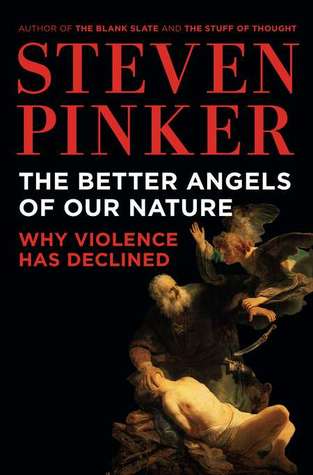Human Combinatoric Reasoning
Humans, of course, were not created in a state of Original Reason. We descended from apes, spent hundreds of millennia in small bands, and evolved our cognitive processes in the service of hunting, gathering, and socializing. Only gradually, with the appearance of literacy, cities, and long-distance travel and communication, could our ancestors cultivate the faculty of reason and apply it to a broader range of concerns, a process that is still ongoing. One would expect that as collective rationality is honed over the ages, it will progressively whittle away at the shortsighted and hot-blooded impulses toward violence, and force us to treat a greater number of rational agents as we would have them treat us.
Our cognitive faculties need not have evolved to go in this direction. But once you have an open-ended reasoning system, even if it evolved for mundane problems like preparing food and securing alliances, you can’t keep it from entertaining propositions that are consequences of other propositions. When you acquired your mother tongue and came to understand This is the cat that killed the rat, nothing could prevent you from understanding This is the rat that ate the malt. When you learned how to add 37 24, nothing could prevent you from deriving the sum of 32 47. Cognitive scientists call this feat systematicity and attribute it to the combinatorial power of the neural systems that underlie language and reasoning.223 So if the members of species have the power to reason with one another, and enough opportunities to exercise that power, sooner or later they will stumble upon the mutual benefits of nonviolence and other forms of reciprocal consideration, and apply them more and more broadly.
Notes:
Folksonomies: reasoning combinatorics
Taxonomies:
/pets/cats (0.511887)
/law, govt and politics/government (0.483689)
/health and fitness/disorders/mental disorder/a.d.d. (0.390441)
Keywords:
Human Combinatoric Reasoning (0.955491 (neutral:0.000000)), Original Reason (0.799457 (neutral:0.000000)), cognitive faculties (0.759996 (neutral:0.000000)), cognitive processes (0.756380 (neutral:0.000000)), open-ended reasoning (0.738731 (neutral:0.000000)), long-distance travel (0.734436 (positive:0.274101)), hot-blooded impulses (0.734325 (negative:-0.325711)), broader range (0.729706 (positive:0.237902)), collective rationality (0.729229 (positive:0.416432)), small bands (0.722908 (neutral:0.000000)), Cognitive scientists (0.720926 (neutral:0.000000)), rational agents (0.711504 (positive:0.562500)), mundane problems (0.711105 (neutral:0.000000)), feat systematicity (0.709010 (neutral:0.000000)), reciprocal consideration (0.707388 (neutral:0.000000)), greater number (0.705428 (positive:0.562500)), mother tongue (0.693144 (negative:-0.687990)), neural systems (0.688323 (neutral:0.000000)), combinatorial power (0.684216 (neutral:0.000000)), mutual benefits (0.681568 (neutral:0.000000)), propositions (0.542188 (positive:0.583931)), millennia (0.477612 (neutral:0.000000)), apes (0.466803 (negative:-0.414214)), nonviolence (0.465995 (neutral:0.000000)), sum (0.464985 (negative:-0.411054)), alliances (0.461986 (neutral:0.000000)), literacy (0.461606 (neutral:0.000000)), course (0.459873 (positive:0.318648)), state (0.459730 (neutral:0.000000)), Humans (0.459644 (neutral:0.000000))
Entities:
long-distance travel:FieldTerminology (0.889596 (positive:0.274101))
Concepts:
Psychology (0.949163): dbpedia | freebase | opencyc
Cognition (0.878752): dbpedia | freebase | opencyc
Reasoning (0.789348): dbpedia | opencyc
Reason (0.772903): dbpedia | freebase
Thought (0.765442): dbpedia | freebase | opencyc
Rationality (0.640846): dbpedia | freebase
Language (0.633114): dbpedia | freebase | opencyc
Knowledge (0.608077): dbpedia | freebase





